When you talk to the three founders of the company, you quickly realize that very different characters joined forces who do not always agree. But it is precisely the discussions that resulted from this conflict and juxtaposition that ultimately led to the formation and proliferation of Nicklas & Partner – or as you know it today, INP. Despite all their differences, one thing was always particularly important to all of them – that the chemistry was right! This basic idea based on familiarity and friendliness can still be found in the company today, deeply rooted in its philosophy, values, goals, and guidelines, although the number of employees has increased significantly since 1989. But first things first.
The motivation to form a company was different for Katharina Jester-Sartingen than for Norbert Nicklas and Klaus Jungknecht. On the one hand, for her, as a young widow with an eight-month-old baby, it was about pure survival. On the other hand, she pursued her vision of reconciling family and career. She had already opened a planning office before Norbert Nicklas and Klaus Jungknecht came into play. At home in her apartment she planned the first projects in ACAD on an old 286 computer, which served so
well that it later became the mascot of the company. She had the support of three students and engineering draftsmen who converted the circuit diagrams into technical drawings.
Mr. Nicklas and Mr. Jungknecht met on a construction site in Iran. They realized how difficult it can be to work abroad and that local engineers often lack proper support. They came to the conclusion that there had to be a better way. "Norbert told me that the two of them had been thinking about forming a company independently of me. This is how Nicklas & Partner GmbH emerged from the consultancy office," says Mrs. Jester-Sartingen. A key factor for the foundation was above all the right chemistry and mutual trust. Mrs. Jester-Sartingen and Mr. Nicklas had known each other since 1985 from the Mülheim-Kärlich construction site, while Mr. Jungknecht and Mrs. Jester-Sartingen had yet to meet. "The basis for Nicklas & Partner was really the friendship between Norbert and me," Mrs. Jester-Sartingen states. "That's right, isn't it, Norbert?" She looks at him and both of them laugh. "Klaus already scored bonus points with me before the meeting because Norbert trusted him," she explains. There was a first meeting in Neustadt-Hambach, which in internal circles was also described as legendary. The chemistry was right and so the LLC was born.
In addition to the human component, which was right from the get-go for all three of them, their respective professional skills also complemented each other. "Of course, we also thought about the technical completion of the whole thing," reports Mr. Nicklas. "Like Klaus, Kathrin studied power engineering/technology, but then specialized in closed-loop engineering, and I come from the field of measurement technology." "That's true," adds Mr. Jungknecht, "but I ended up more and more taking care of sales and marketing." A perfect addition.
As Nicklas & Partner gradually expanded, Switzerland became the first subsidiary after ten years in business. "That was a huge step back then! One of the biggest in the company's history." Mrs. Jester-Sartingen's eyes begin to glow zealously when she thinks back to this time. "The whole thing developed out of one of my projects and became our first fixed-price project that we implemented with ABB in Switzerland." There was no template for the calculation of the offers. So what did Mrs. Jester-Sartingen do? "We calculated in reverse. We analyzed the time and effort put into old projects, determined the time we would need for the newly requested project and thus developed our own base rate, which we then used to calculate the prices for future projects."
Switzerland was Nicklas & Partner's first experience abroad. For more than two years, Mrs. Jester-Sartingen took care of sales and marketing in Switzerland and was on site at least once a week. With Michael Kopp as project manager, the company was also technically well positioned in the neighboring country. Nevertheless, in the long run this became a time constraint. Especially for sales, they needed someone who was familiar with Switzerland and its customs. So the three of them went on a quest and found what they were looking for. "We found someone who could take over my position and grow the sales department", says Mr. Jungknecht. "That was Thomas Kramer. Ultimately, a project office became a full branch office." This idea seems very familiar. Because being close to the customers and supporting them abroad is still one of INP's fundamental work methods today.
Mrs. Jester-Sartingen responds to this question: "Yes, that's true. That was our concept early on: We go abroad with the customer! It didn't really matter whether we were talking about a temporary project office or a permanent branch office. We didn't just do this in Switzerland, but also in the USA and South Africa. In the USA, we initially handled all the gas turbine projects for which we needed a work permit. So, ultimately we also set up a branch there."
If you look at the humble beginnings from the small office of our first headquarters in an apartment in Speyer to the company today with branches in more than ten countries, you can see that it didn't happen overnight.
This success story could not have been written without the fundamental idea that accompanied it along the way. This success is based on a concept, a strategy. More than anything else, the growing number of employees very quickly increases the amount of responsibility. You first have to learn how to handle it, as did Mrs. Jester-Sartingen, Mr. Nicklas and Mr. Jungknecht. However, as Mr. Nicklas describes it, the three of them really did not see it as a problem, but rather as a challenge. "Actually, there was an idea right from the get-go, but we first had to grasp and verbalize it. We were all still pretty wet behind the ears," admits Norbert Nicklas. "That's why we often sat together and discussed intensively." "Pretty quickly thereafter we developed our three-pillar model," Mrs. Jester-Sartingen remembers.
"That was an image for the company. The pillars were the planning department, the personnel provision, and the switch cabinet construction; above it was the roof, symbolizing Nicklas & Partner." This model was the basis for decision-making. But not everyone agrees that this model was the origin of INP's strategy. Mr. Jungknecht is rather skeptical in that regard: "That was maybe an introduction to the strategy. Because if you were to show our old concept to someone today, they would laugh hysterically." Whether you call it a model or a first strategy is purely a matter of semantics.
In any case, the three-pillar model was an accomplishment from 1993, when the ideas of Mrs. Jester-Sartingen and Mr. Nicklas and Mr. Jungknecht could no longer be reconciled but we ultimately noticed that one did not quite work without the other. During that time, temp agencies popped up all over the place like weeds. Mr. Nicklas and Mr. Jungknecht wanted to jump on this train and enter the leasing business on a larger scale. Their reasoning was simple: "It's important to remember that at the
beginning we had only three, at best five employees," explains Mr. Nicklas. "With the leasing personnel, we were able to increase our capacity tenfold and suddenly had 50-60 employees. This enabled us to handle more projects. Klaus and I also wanted to have two lines of business. Our idea was that if it didn't work out with the planning department, we could simply switch to personnel provision. We quickly realized that it wouldn't have worked without the planning department. So, instead of just focusing on one thing, we diversified and created the three-pillar model." Mrs. Jester-Sartingen agrees: "It's important to understand that I probably wouldn't have started the personnel provision division on my own. You, in turn, probably wouldn't have had a planning department. So, clearly our ideas were really the basis for the strategy of Nicklas & Partner and therefore also of INP as it is today." In a quest for consensus, the ideas of Mrs. Jester-Sartingen and Mr. Nicklas and Mr. Jungknecht were combined. In retrospect, it's clear that one thing has always helped the other," adds Mr. Nicklas.
The three-pillar model, however, was only the beginning and came about rather intuitively. What the founders of Nicklas & Partner lacked was a method. Mrs. Jester-Sartingen attended a seminar on "Balanced Scorecard". This model correlates individual points and makes it possible to determine whether time and effort correspond to the yield. "This ‘Balanced Scorecard' was actually the first real introduction to strategy for me," says Mr. Jungknecht, who is obviously still enthusiastic about it today. "It was a method that could be used for strategy planning."
"For us, this was the first method of integrating employees in the company strategy," explains Mrs. Jester-Sartingen. "Previously we discussed strategies among the three of us, but from that point on we included the employees." It was clear to everyone how important it was to know in which direction the company was going and how to design a plan for the big picture. For this purpose, the first strategy meeting was chaired by a speaker in Landau in 1998/99. Mrs. Jester-Sartingen remembers "it wasn't all that easy". "There were 20 of us, and we had a huge problem finding premises to accommodate so many people at that time." She laughs when she thinks about this situation.
"Of course, we could've simply held the meeting on a smaller scale, but it was important to us that each employee understood what we wanted; in return, we also wanted to hear what our employees thought, what their ideas and expectations were." This consensus policy has not always been easy, but it is still one of the basic elements of INP's management style today.
"If you sit at a table with five people and everyone has a different opinion, it's difficult to reach an agreement, and it's even more difficult with 20," says Mr. Jungknecht. "Nonetheless, if you want to move forward, you have to move towards each other and show some flexibility. That's a basic democratic principle. Ultimately, we've always done very well with it, because in the end, the mutual dialog always produced a decision that was supported by everyone."
Georg Jester, the current Managing Director of INP Germany, was also present at one of these first strategy meetings. "Through his studies in economics, Georg was more familiar with corporate strategy models and with terms like 'Raising Stars' or 'Cash Cows'," Mr. Jungknecht adds assuredly. "He took up our strategy structure from that time and developed it into the current, professional strategy system." To this day, there is still a big annual strategy meeting in which the company values are reviewed and adjusted on a case-by-case basis. Despite this flexible, versatile approach, you can still see that the strategic concept of that time corresponds to the fundamental values of today and forms the basis for relevant company decisions.
Mrs. Jester-Sartingen summarizes the elements that can be found in the company policy then an now: "We have quite a broad base. We don't just rely on competence alone. Moreover, we want to be seen as a reliable, competent, and trustworthy partner. We follow our customers abroad and take care of all their needs." Apart from that, it has always been essential for the three of them to take responsibility and plan for the long term. This is another reason why they have invested so much in strategic areas. "We didn't just want to stuff our pockets," explains Mr. Nicklas. "We also wanted to show that we are here for the long haul and that we offer our employees a future. After all, we have been doing this for 30 years now," Mr. Nicklas proudly sums up. "INP is Not a One-Hit Wonder!"
During a crisis in 2000, the strategy helped them through difficult times. Orders failed to materialize and it became more and more difficult to keep the company afloat. The planning department was about to shut down. You can definitely sense how much this period was aggravating the company founders. "We didn't receive any projects from the power plant sector. None, zero, zilch!" Mrs. Jester-Sartingen gets emotional as she talks about it. "We didn't just want to let our great employees go, so we decided to accept the DANA project." The DANA project came from the automotive industry, and it was about automation technology. A division that was completely foreign to the technical team at INP. They had to learn completely new material and develop expertise in PCS7 and robotics. Besides that, money had to be raised. The three founders provided their own homes as collateral so that they could keep the company going. "Back then, I went jogging at 11 PM at night to unwind. Because if that had gone wrong, none of us would have had anything left," says Mrs. Jester-Sartingen with a sad facial expression. The staff also made a great contribution. Like the founders of the company, they waived compensation for overtime and their Christmas bonus. "We all came closer together in these difficult times and supported each other," Mrs. Jester-Sartingen says as her eyes light up.
She and the two gentlemen know what they owe to the team back then. "Without the cooperation of our employees, I don't know if we would stand here like this today or if we would still exist at all," adds Mr. Jungknecht.
Although Norbert Nicklas is the only one of the three founders who will still be active in day-to-day operations in 2019, the other two will still be involved in the fate of their own company. Together with the two new shareholders, Georg Jester and Knut Mertens, all three founders continue to take responsibility for the development of INP.
What are their hopes for the future of INP, the company, and its employees? Mrs. Jester-Sartingen immediately comes up with something: "We should cultivate open communication across all hierarchies. It's so important to talk to coworkers and employees and to listen to what they have to say. That's the only way for each individual to feel like they are a part of it and that they can make a personal contribution. Of course, it's a little bit more difficult today in a large company than it used to be." Mr. Jungknecht also sees the trust of the employees as an essential component: "The company is changing, the people are changing, and so is society. This requires a certain amount of open-mindedness, attentiveness, and flexibility at all times. This is precisely why it's so important that we retain the trust in the employer and that the feeling of belonging to the company persists."
Mr. Nicklas confirms, "our motto this year puts this in a nutshell." "More than 500 people contribute to INP. They are the foundation for our work."
"Exactly," adds Mrs. Jester-Sartingen in agreement, "we have so many interesting people, employees, minds ... you can create a lot with that. We encourage everyone to continue to contribute and thus assist in creating an innovative and modern company."

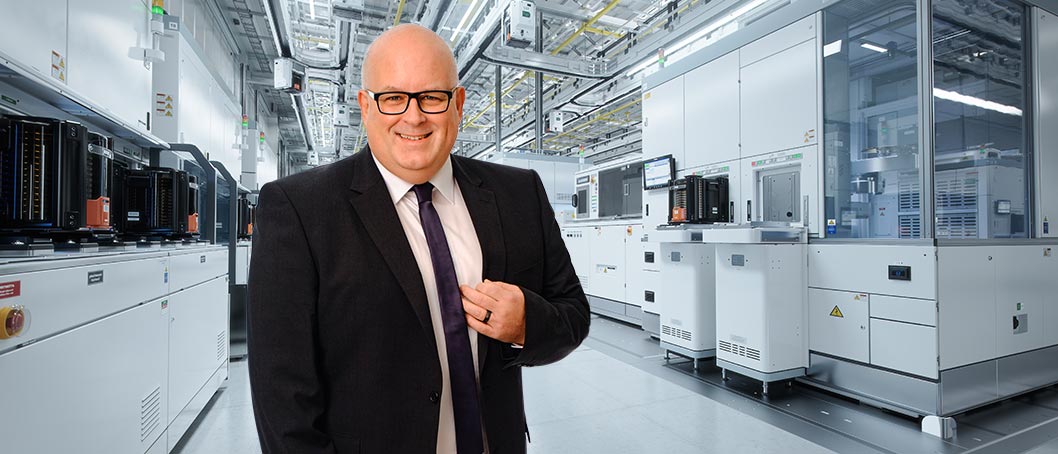
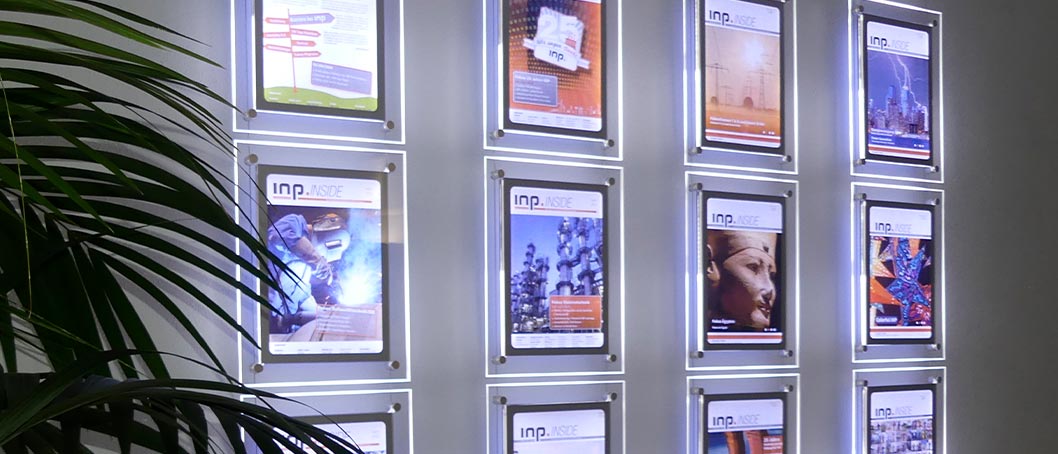
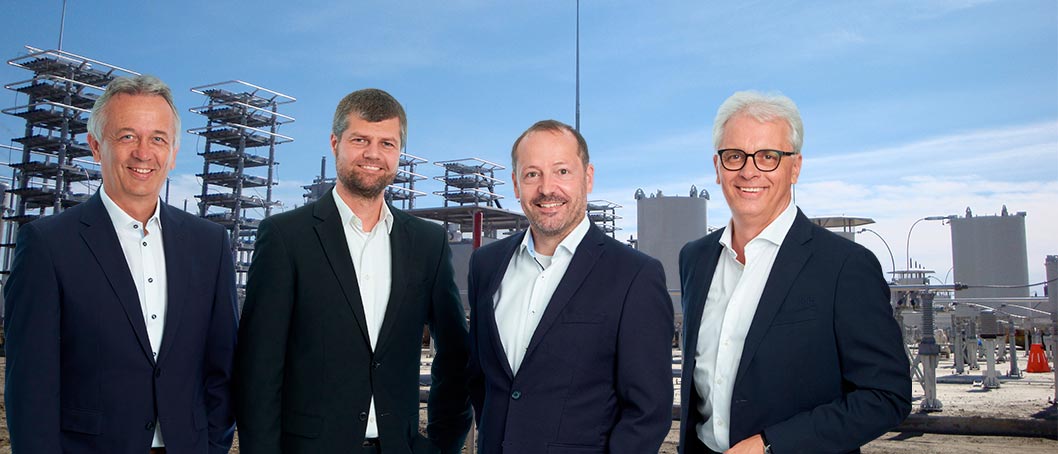

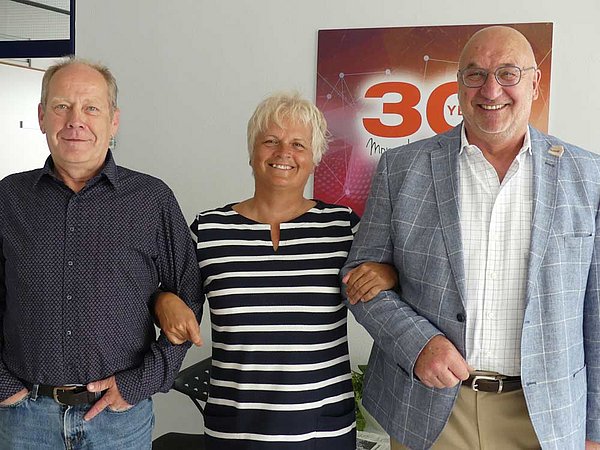
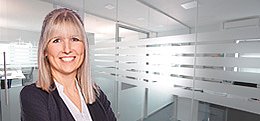
 @
@

